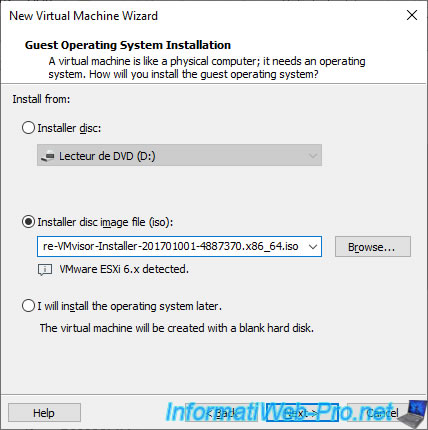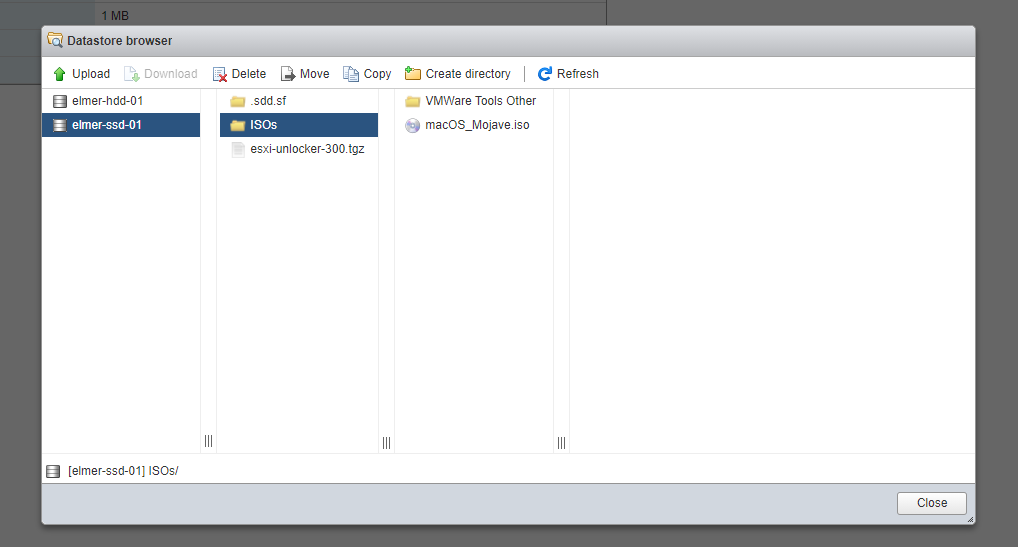
- INSTALL OS X ON ESXI INSTALL
- INSTALL OS X ON ESXI UPDATE
- INSTALL OS X ON ESXI ARCHIVE
- INSTALL OS X ON ESXI UPGRADE
- INSTALL OS X ON ESXI FULL
From the App you can power on VM’s, take or return to snapshots, and manage which display is assigned to a VM. This is not exactly End-User friendly, so I wrote an Android App to manage the VM’s residing on this box. VMware ESXi normally requires the Vsphere Client for management to be run on a separate pc or VM. One VM runs in the background with a wifi card passed through, acting as an integrated WiFi access point. These can run out of the HD 4650, or any of the HD 6450’sĪll simultaneously with the SteamOS’s, in any combination. I also have other VM’s of other OS’s defined. I can also define many more SteamOS VM’s, and run any 4 of my choosing. They can all be returned to “New Install” state at any time. The VM’s are protected by snapshots, so no need for a recovery partition. I only gave the VM’s 2 cores from the i7 initially. The performance is equivalent to a SteamBox on a dual core board with the same graphics card. The RAM assigned is owned by the VM, but CPU cores can be over-provisioned. How much RAM or CPU cores are assigned to each VM is defined in its config.
INSTALL OS X ON ESXI FULL
PCI Passthrough is where the physical hardware is passed through to the VM, with its full capabilities. These run concurrently, side by side, each using one of the HD 6450’s.and a USB using PCI Passthrough. I have multiple VM’s defined, 4 of which are SteamOS. This runs VMware ESXi 5 on the bare metal, using the 2gb SSD and the Nvidia PCI card as the console. Obviously this can be tweaked to your needs (or you could decide not to use a template at all), but for all those fancy things I’ll have to refer you to the vFuse wiki here.So I built a multiheaded SteamBox, this one is a little different on the inside: Those who are unfamiliar with vFuse might want to have a look at one of my previous post here, but for those who just want to know what to change in the template, here is my basic template to use with vFuse.

With VMWare Fusion 11.5 goes a compatible vFuse version, so I went for the latest (at this moment of writing) version 2.2.5. I used the (at this moment of writing) pre-release version v1.10b587 which worked fine. VFuse needs a macOS DMG to create the VM, so no better tool imo than AutoDMG.
INSTALL OS X ON ESXI UPGRADE
Reboot your server and DONE! VMWare Fusion 11.5īecause vFuse needs VMWare Fusion to be running, and we need Catalina support, we need to upgrade our VMWare Fusion to 11.5.
INSTALL OS X ON ESXI UPDATE
If all goes well, you will end up with a long block of text confirming the update is completed.
INSTALL OS X ON ESXI INSTALL
The hierarchy of files and paths of the zip file needs to be maintained.Īfter uploading the bundle to the datastore, and putting the server in maintenance mode, the only thing left to do is run the following command: esxcli software vib install -d “/vmfs/volumes/Datastore/DirectoryName/EXACT-NAME-OF-THE-BUNDLE-FILE.zip”
INSTALL OS X ON ESXI ARCHIVE
If that's the case, compress it again but make sure to only add the subfolders and files to the archive and not the main folder where the content was zipped to.

zip bundle on macOS it might automatically unzip it depending your system preferences.

There are multiple ways of updating your ESXI, but my preferred method is using the offline bundle. Subject to your server, free trial or VMWare licensing you will need to download the ESXI 6.7 Update 3 (or 2). Until now I was running ESXI 6.7 and this does not run macOS 10.15 Catalina (VM stuck at Apple Logo at boot). So, first of all: ESXI, as this is where my VM is gonna live.

Thanks to everyone who reached out to me during my recovery ! 2 months of inactivity puts me in a situation where it urgently time to get back up to speed and up to date with all changes in the MacAdmin world.


 0 kommentar(er)
0 kommentar(er)
